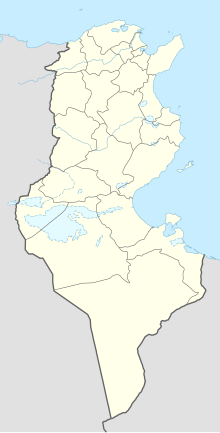Siege of Tunis (1694)
This article has multiple issues. Please help improve it or discuss these issues on the talk page. (Learn how and when to remove these messages)
|
| Siege of Tunis | |||||||||
|---|---|---|---|---|---|---|---|---|---|
| Part of the Tunisian-Algerian War (1694) | |||||||||
| |||||||||
| Belligerents | |||||||||
| | | ||||||||
| Commanders and leaders | |||||||||
| | | ||||||||
| Strength | |||||||||
| 7,600 troops:[2]
| 15,000 infantry[3] 600 horses | ||||||||
Location within Tunisia | |||||||||
The siege of Tunis was a siege fought in 1694, between the Deylik of Algiers, and Muradid Tunis, during the Tunisian-Algerian War of 1694.
Background
[edit]The Tunisian prince Mohammed ben Cheker asked the dey of Algiers, at the time Hadj Chabane,[4] for help in order to make himself Bey of Tunis. The dey of Algiers accepted his proposal, invaded Tunisia in 1694,[5] and defeated the Tunisian army at the Battle of Kef on June 24. Chabane then marched on Tunis, where Mohammed Bey el-Mouradi took refuge after his defeat.[6] The goal of Chabane was to make Tunis a simple governorate (Beylik) in a similar fashion to the other Beyliks of Algeria, such as the Beylik of Constantine.
Siege
[edit]The Algerian army a arrived in front of Tunis in August and started the siege. Despite the efforts of the Tunisian defenders, Tunis fell after 3 months, and the Algerians plundered the city on 12 November 1694, and Tunis fell under the control of the Dey of Algiers, with administration by Chaabane Khodja and Ben Cheker. [7]
Ben Cheker became the Bey of Tunis forcing Mohammed Bey el-Mouradi to flee to Chios or the Sahara.[8]
Aftermath
[edit]Mohammed Bey el-Mouradi fled to Chios or the Sahara and Ben Cheker reigned over Tunis for six months as a governor for Algiers, but his reign was tyrannical and led the Tunisians to appeal to Mohammed Bey el-Mouradi in exile The latter defeated Ben Cheker On May 1, 1695 at the Battle of Merguellil, near Kairouan, and made himself bey of Tunis again.[9]
References
[edit]- ^ Plantet, Eugène (1893). "Correspondance des Beys de Tunis et des consuls de France avec la Cour: 1577-1830".
- ^ Plantet, Eugène (1893). "Correspondance des Beys de Tunis et des consuls de France avec la Cour: 1577-1830".
- ^ Plantet, Eugène (1893). "Correspondance des Beys de Tunis et des consuls de France avec la Cour: 1577-1830".
- ^ Mahfoud Kaddache, L'Algérie des Algériens, p. 411.
- ^ Perkins, Kenneth J. (2016-10-12). Historical Dictionary of Tunisia. Rowman & Littlefield. ISBN 978-1-4422-7318-4.
- ^ Delmas, Henri (1887). Histoire d'Alger sous la domination turque (1515-1830). Paris. p. 265.
{{cite book}}: CS1 maint: location missing publisher (link) - ^ Alphonse Rousseau, Annales tunisiennes ou aperçu historique sur la régence de Tunis (Bastide, 1864)
- ^ Guellouz, Azzedine; Smida, Mongi; Masmoudi, Abdelkader; Saadoui, Ahmed (2010). Histoire générale de la Tunisie (in French). Tunis. pp. 78–79. ISBN 978-9973-84-476-7.
{{cite book}}: CS1 maint: location missing publisher (link) - ^ Plantet, Eugène (1893). Correspondance des Beys de Tunis et des consuls de France avec la Cour: 1577-1830 (in French). F. Alcan.


 French
French Deutsch
Deutsch